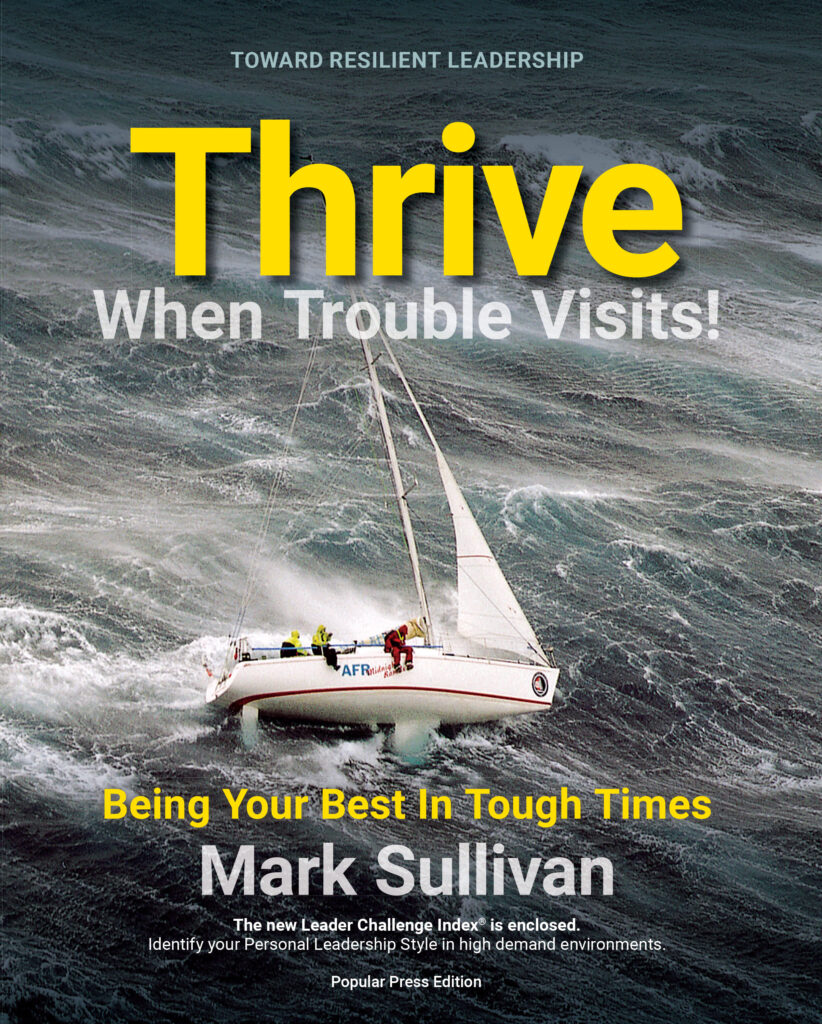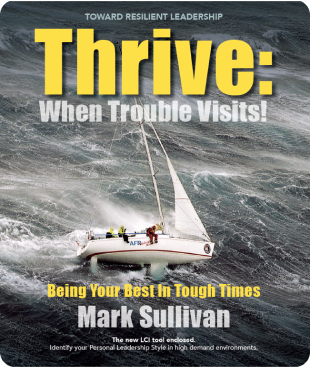John Sculley
Captain of Industry and Business Icon, Motivational Speaker and Conqueror of a Childhood Impediment
If you enjoyed this story, consider ordering Mark’s new book.
Barbara Lopez
Retired Global Chief Executive of Drug Information Association, Board member of Children’s National Health Care System and National Research Institute
Of the world’s largest multi-billion-dollar, global research company’s nine leaders, she would be the only woman. Barbara Lopez was painfully aware of what she was stepping into in 2007.
So were her new colleagues.
Shortly after Lopez started, one of her fellow executives approached her during a break in a meeting.
Barbara, she recalled him saying, when I heard we were bringing in a woman as an officer, I’ve got to tell you, I was really upset. I had no idea what I was going to be facing. But I have to tell you, you are really smart, and you’re feminine, too.
Lopez weighed his words. Clumsy though they were, the man was trying to pay her a compliment. She was being welcomed into the fold. She decided to go with it, heeding her CEO’s advice about listening and absorbing the culture rather than pouncing with a new strategy, and soon she found the approach working.
“Probably three or four months into it, the CEO took me aside and he said, ‘Have you noticed? They’re all copying you now. They’re all using your ideas. They’re using your language.’ And they were. I brought a sense of strategy, of vision, of score card, of metrics—it was all new for them. And frankly, it was a great time, because even though they were very different from me, I felt like I was figuring out how to fit, how to be credible at the table.”
Lopez has built an impressive career of figuring out how to fit—and finding the fortitude to keep trying. A professional adventurer, she’s held leadership roles and board positions across industries, forming a reputation as an intense, spirited executive, a force to constantly be reckoned with. Her strength is her trademark, a personal toughness forged through decades of breaking barriers of gender and ethnicity—and formed during a life-defining experience that rattled her joyful childhood.
“I had a vision at a very young age of what success looked like,” she said. “And when I look back at it now, I think there were lots of things that were wrong about it. You know, a parent may look at their child and say, ‘Boy, I’d love to have a girl that was that,” But I look back at it now and I say, ‘My God … I was a child.’”
She grew up in a small town outside of Pittsburgh, one of seven children born to parents completely and unconditionally committed to the family’s education and health. They were a big family that filled up the whole church pew on Sunday, and they felt so close that it seemed unbelievable that tragedy might break their bond.
“How could God do this to a child?” her parents cried.
Lopez’s younger sister Mary was 5 when she was diagnosed with neuroblastoma, a cancer that develops in immature nerve cells. A regiment of surgeries and chemotherapy followed, as did a shift in the nuclear dynamics of the family. Lopez, just two years older, took over as Mary’s protector.
“She was in the first grade, and she couldn’t really go to school,” Lopez said. “But the days she could go, and she could get up, my mother would get us both dressed, and I would walk her to school. I remember walking, and she would walk a bit and get tired, and we would find a little place to sit on a curb, and we would just sit for a while. And I’d wait for her to be ready to keep going.”
Mary was just 8 when she died, leaving behind a crushing grief that sunk her parents into a deep, encompassing depression. Lopez, then 10, and her older sister, Nancy, stepped in to help. They packed lunches for the three youngest children and made sure the laundry was done.
“I mean, I just kept going,” Lopez said. “And honestly I look back on it and … this is why I made the comment about things happening for me very young, because I was out the gate very early, figuring out my own classes and doing my homework without any guidance. I got a job when I was old enough to work at the local bakery and make a few bucks so I had pocket change. I was living kind of like a little adult early on, and I think that set me up for victory.”
She found a role model in her older brother, the family’s eldest child. Victor was six years her senior, the valedictorian of his high school, a curious intellectual who would go on to become a successful physician. Victor and his friends pushed Lopez to succeed, coaching her through Shakespearean sonnets and rooting for her academic accomplishments. She was just a kid, but they showed her what her future could be.
“I was very goal oriented,” Lopez said. “I literally felt like I lived a life that other people would have lived in twice as many years. And I made some decisions that were wrong, because I didn’t have the intellectual or emotional maturity that would go along with those sort of major decisions. But what I learned about myself is that I know how to take care of problems. I’m very tough. I don’t let things get me down very much.”
That strength became an important ingredient in her life. As Lopez developed from a scientist to senior leader at highly regarded science, research and health care organizations, her toughness built her into a person who could dominate in the workplace and tackle the challenges that might have cowed others. It kept her head high in a board room where no one else looked like her—and taught her that even when things didn’t feel right, she could figure them out.
“It’s also created a person who not everybody likes, you know,” she said. “I know that I’m intense. And I sometimes think, ‘Oh, in this next situation, I’m going to really try to not be intense,’ and … it comes with me. I can’t stop it.”
Yet this did not stop her in serving in several executive leadership roles, and a host of corporate and nonprofit boards, including The Ohio State University Wexner Medical Center and the Children’s National Research Institute.
While her laser focus can make her intimidating, it’s also been key to her success in managing multimillion dollar businesses and navigating complicated new environments. One such example, was her proposing to the board of her Columbus-based, life science research business that they needed to make the largest investment they had ever made to accelerate a key line of business, or to exit it all together. There was no middle ground. She recognized a very unique opportunity; but it involved spending what was considered a king’s ransom. It was over 100 million dollars just in building and equipping a new tier one science facility and staffing it with world class talent.
This could shut the company down if everything didn’t go perfectly. In-spite of the risk of potentially losing her job and the business going bankrupt, the board trusted her and her compelling pushback on what could be.
The economy did weaken at the worst of times, but this was a women with nerves of steel, that many would say would be the next CEO. In taking a bold stand they rallied around her proposal.
On my end, as the Chief Talent Officer, at this same organization, she was one of my client executives. I couldn’t help but marvel at her leadership, but as importantly, the example she was setting for all to see. There was genuine risk and severe consequences potentially at play—many who could lose their job; yet there was also informed, bold thinking; courage, humility and humor. Years later, this life science business became untouchable in generating research that has saved many lives, unparalleled to what was ever imagined. Who was this person that could be so publicly vulnerable yet so sturdy and strong?
Underneath this tough exterior was someone with heart. Lopez cared deeply for others like nobody’s business. Something she would never say about herself. Yet I believe this was her secret sauce. People would follow her to the edge of a cliff because she gave part of her soul to others. She mentored young women in a hands-on way. She regularly took mid-career employees to lunch to get them excited or more deeply committed about what they were doing. She had junior executives shadowing her meetings up close to see what it was like to be on the firing line. She regularly held fireside chats with troubled research, product or sales teams to explore and encourage them to not give up or give in when it was the easier thing to do. In some ways it was like Lopez being back home as a ten-year-old looking after her younger, struggling five year old sister. That is, being there for others in a deeply personal, validating, inspiring fashion.
In 2013, Lopez was named the global chief executive of the Drug Information Association, known as DIA. It was a job she didn’t even know she wanted—and then couldn’t wait to start. DIA connects life science professionals from more than 80 countries, with the goal of collaborations leading to better policies, regulations, science, research and development—for better patient outcomes worldwide.
“I was in love from the first time I walked in and met the wonderful people at DIA,” Lopez said. “But I came into an entirely new ecosystem. I had zero experience in this. I didn’t even know it existed.”
She found her way, naturally. She knew she could, because she’s done it time and again. That’s what toughness teaches you. Lopez had learned young—too young, unfortunately—that life isn’t a paved path. You’re going to hit bumps even if you try your best to steer clear, and preparing for the worst means you’ll be ready should you find yourself there. Each time you conquer an obstacle—or lose to it—you’ll find that you’ve gained something valuable.
“Just be continuously open-minded to the learning that’s going to come,” Lopez said. “If I really was going to unwrap my life, I would tell you that my best outcomes came when I was at a point of a big challenge because I learned so much about how to navigate it— but mostly I learned about myself.”
Consider the next time you find yourself facing a daunting challenge or life circumstance. It could be hard. It may be painful. It just might alter your life forever. But when you emerge from it—and you will—you’ll have discovered something new about yourself. You’ll learn how tough you truly are.

If you enjoyed this story, consider
nec gravida tempor dolor convallis. facilisis in nec gravida tempor dolor convallis.
facilisis in facilisis tempor libero, orci cursus nec orcial nec gravida tempor dolor convallis
2-way access:
- To purchase the THRIVE book separately, click “Buy Now”
- Want to purchase only the Toolkit? Click on the ‘Get Toolkit’ button to access it instantly


